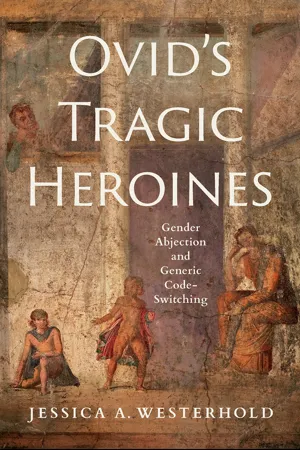
- 228 pages
- English
- ePUB (mobile friendly)
- Available on iOS & Android
About this book
Ovid's Tragic Heroines expands our understanding of Ovid's incorporation of Greek generic codes and the tragic heroines, Phaedra and Medea, while offering a new perspective on the Roman poet's persistent interest in these two characters and their paradigms. Ovid presents these two Attic tragic heroines as symbols of different passions that are defined by the specific combination of their gender and generic provenance. Their failure to be understood and their subsequent punishment are constructed as the result of their female "nature," and are generically marked as "tragic." Ovid's masculine poetic voice, by contrast, is given free rein to oscillate and play with poetic possibilities.
Jessica A. Westerhold focuses on select passages from the poems Ars Amatoria, Heroides, and Metamorphoses. Building on existing scholarship, she analyzes the dynamic nature of generic categories and codes in Ovid's poetry, especially the interplay of elegy and epic. Further, her analysis of Ovid's reception applies the idea of the abject to elucidate Ovid's process of constructing gender and genre in his poetry.
Ovid's Tragic Heroines incorporates established theories of the performativity of sex, gender, and kinship roles to understand the continued maintenance of the normative and abject subject positions Ovid's poetry creates. The resulting analysis reveals how Ovid's Phaedras and Medeas offer alternatives both to traditional gender roles and to material appropriate to a poem's genre, ultimately using the tragic code to introduce a new perspective to epic and elegy.
Frequently asked questions
- Essential is ideal for learners and professionals who enjoy exploring a wide range of subjects. Access the Essential Library with 800,000+ trusted titles and best-sellers across business, personal growth, and the humanities. Includes unlimited reading time and Standard Read Aloud voice.
- Complete: Perfect for advanced learners and researchers needing full, unrestricted access. Unlock 1.4M+ books across hundreds of subjects, including academic and specialized titles. The Complete Plan also includes advanced features like Premium Read Aloud and Research Assistant.
Please note we cannot support devices running on iOS 13 and Android 7 or earlier. Learn more about using the app.
Information
Table of contents
- Acknowledgments
- List of Abbreviations
- Introduction
- 1. Signs of Abject Desire in Ars Amatoria
- 2. Rescripting Phaedra for an Elegiac Role
- 3. Medean Disruptions in Epic and Elegy
- Conclusion
- Notes
- References
- Index of Ancient Sources
- General Index